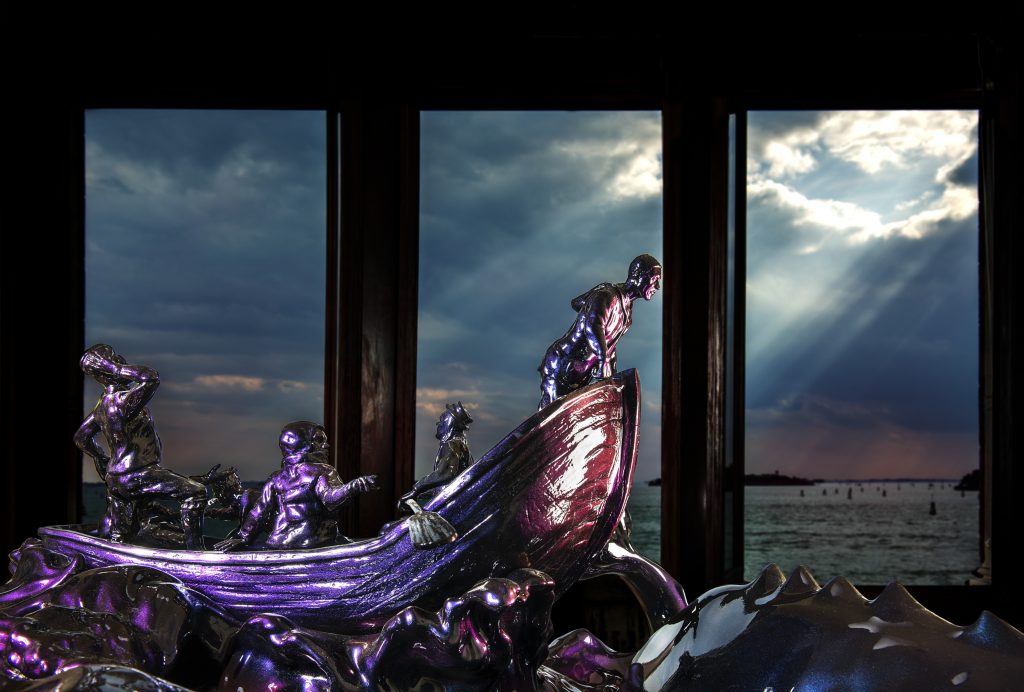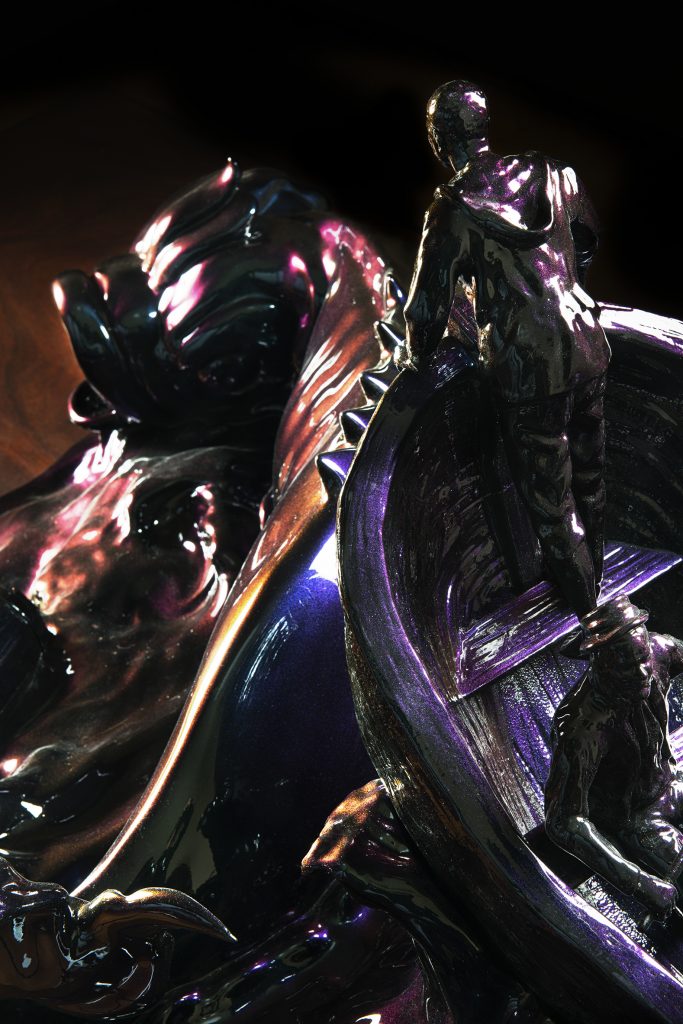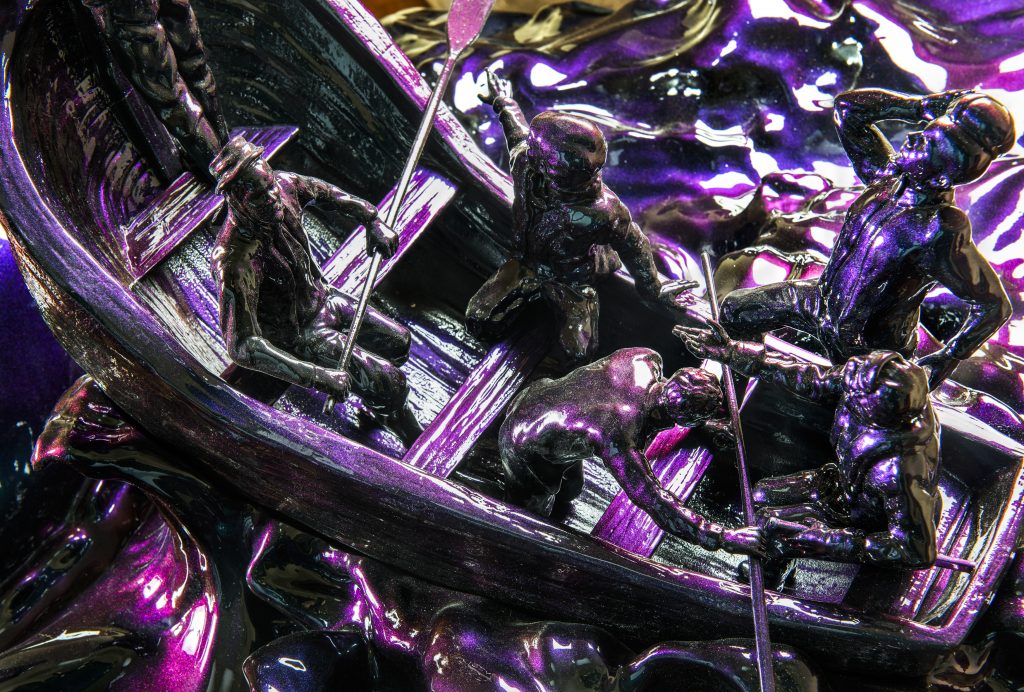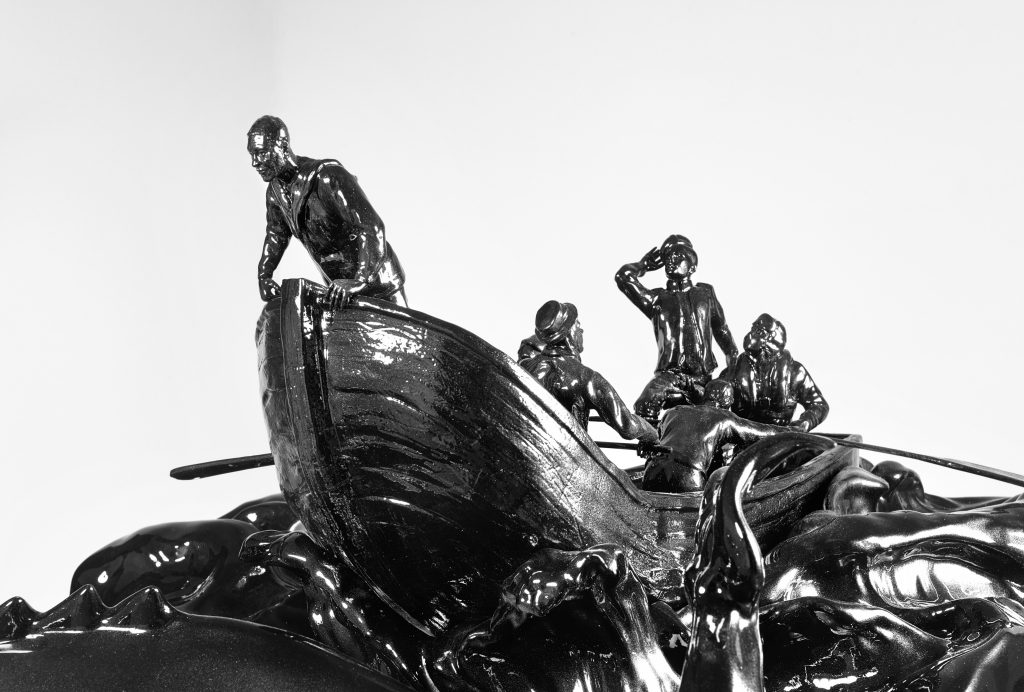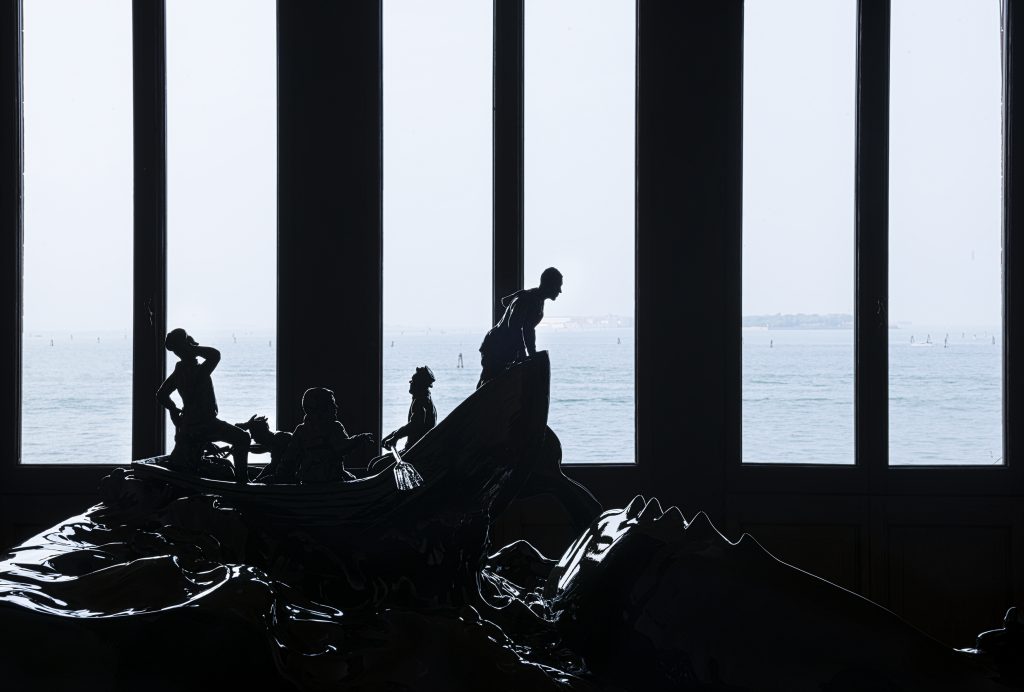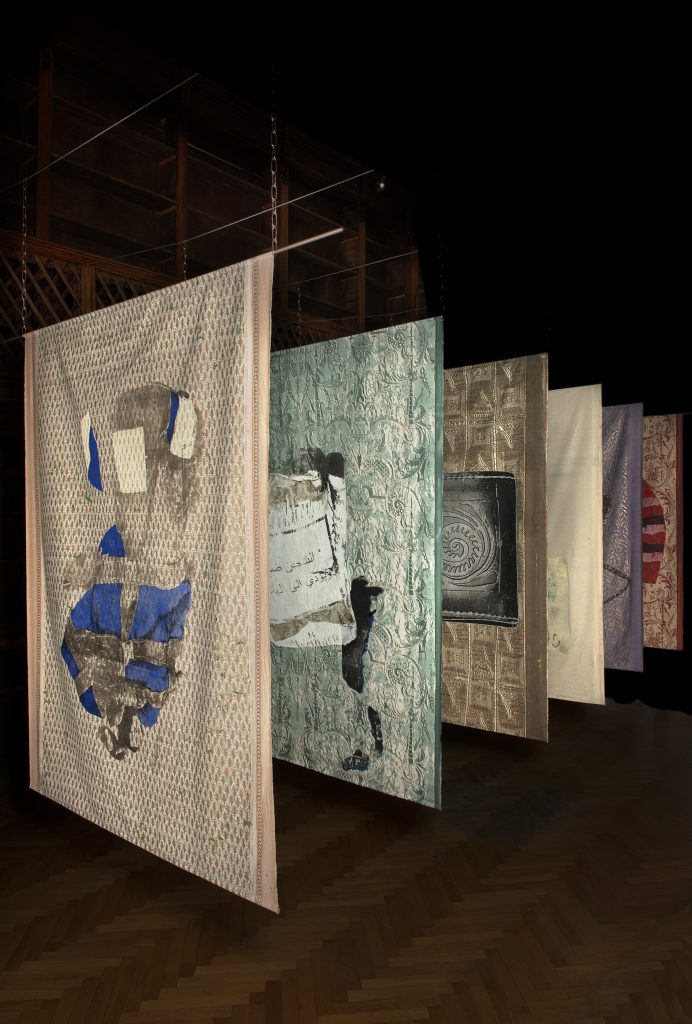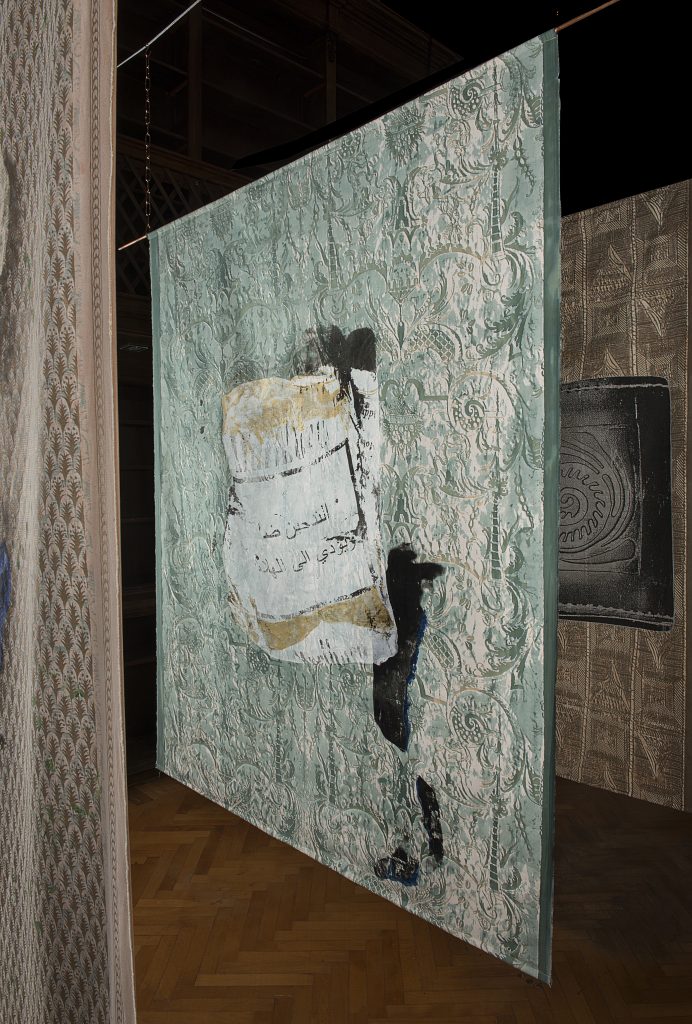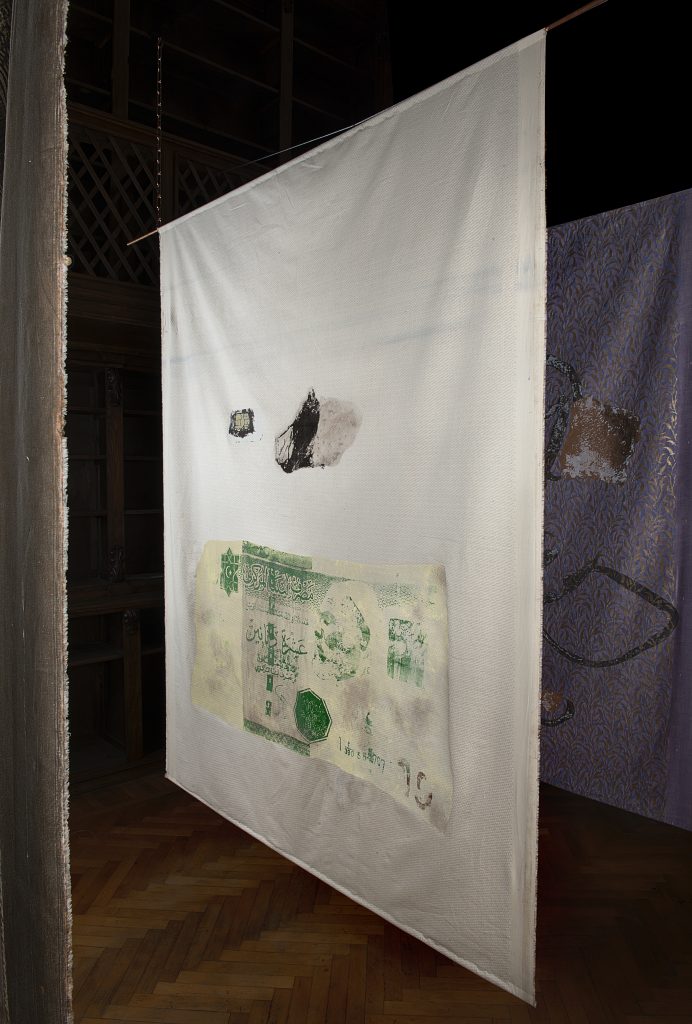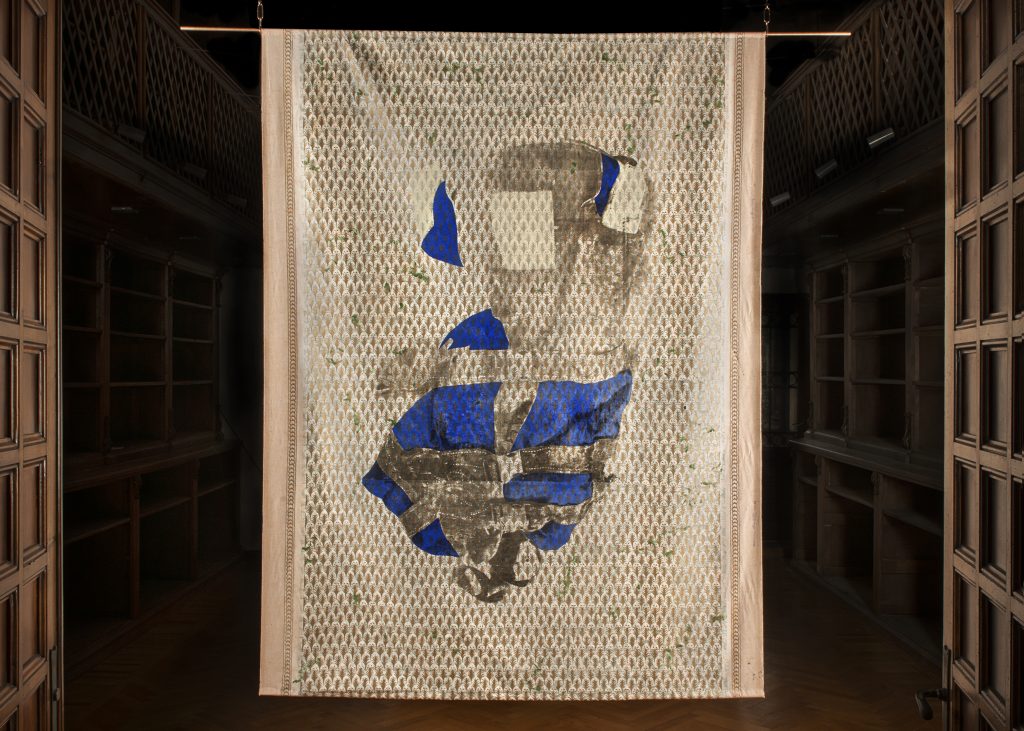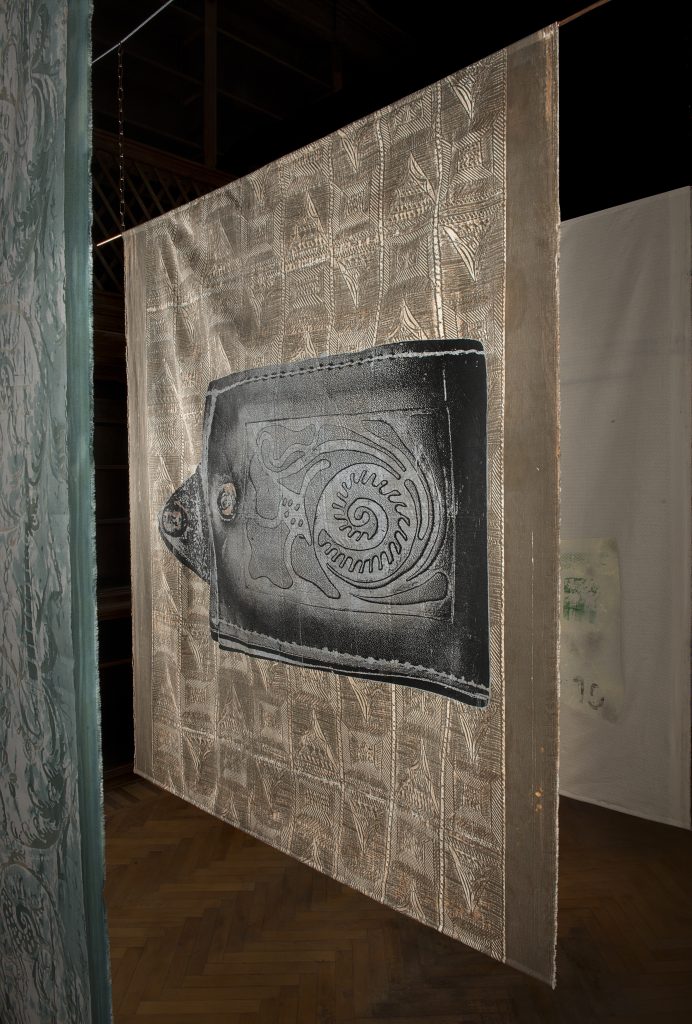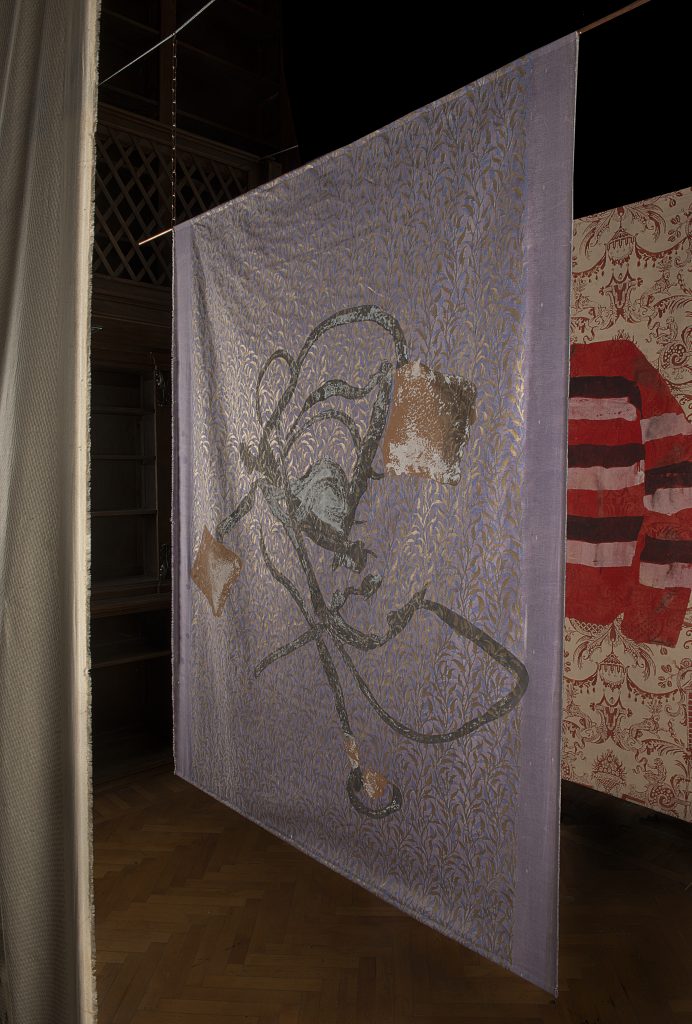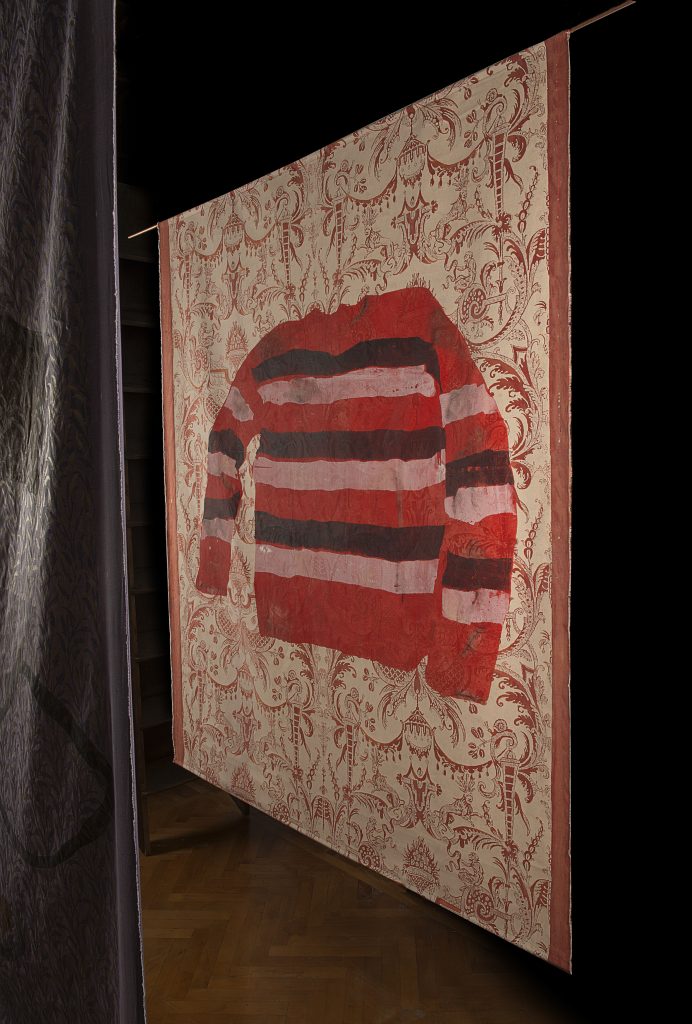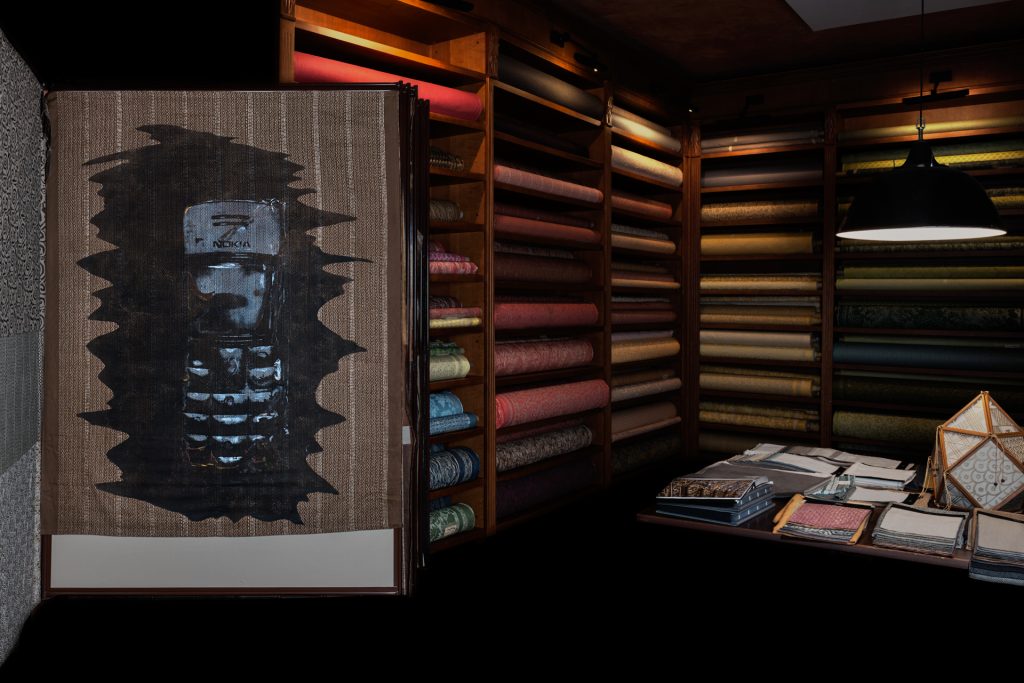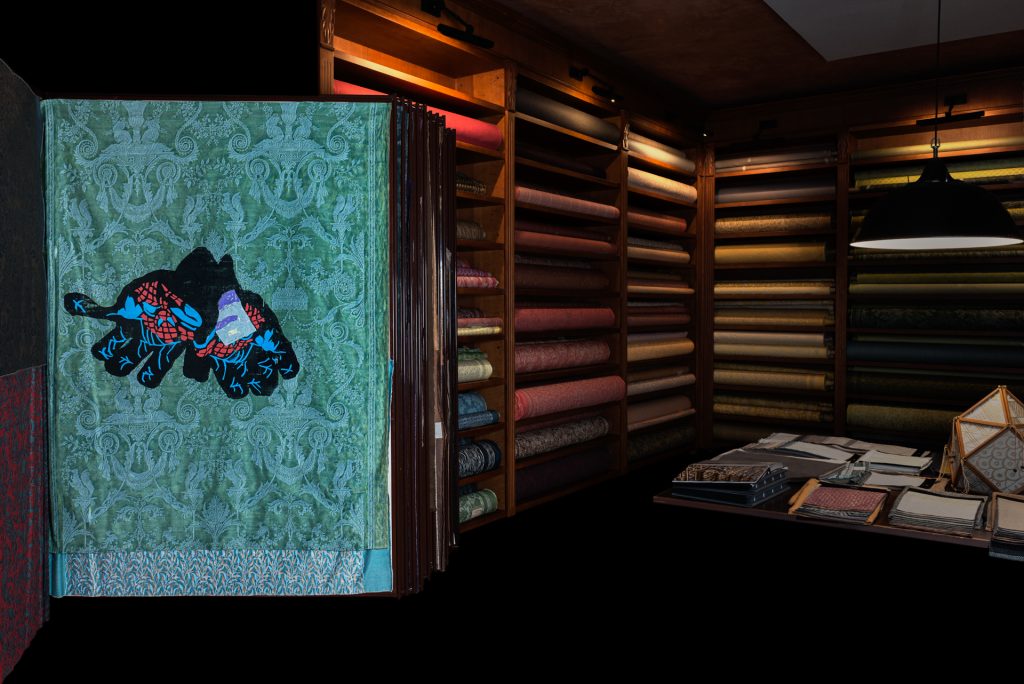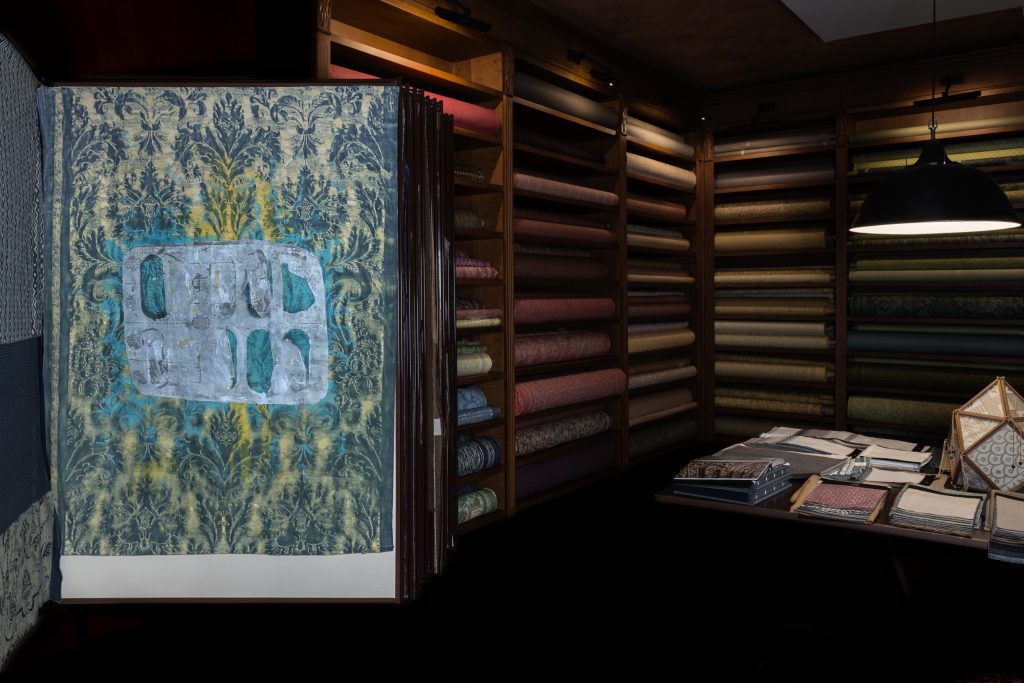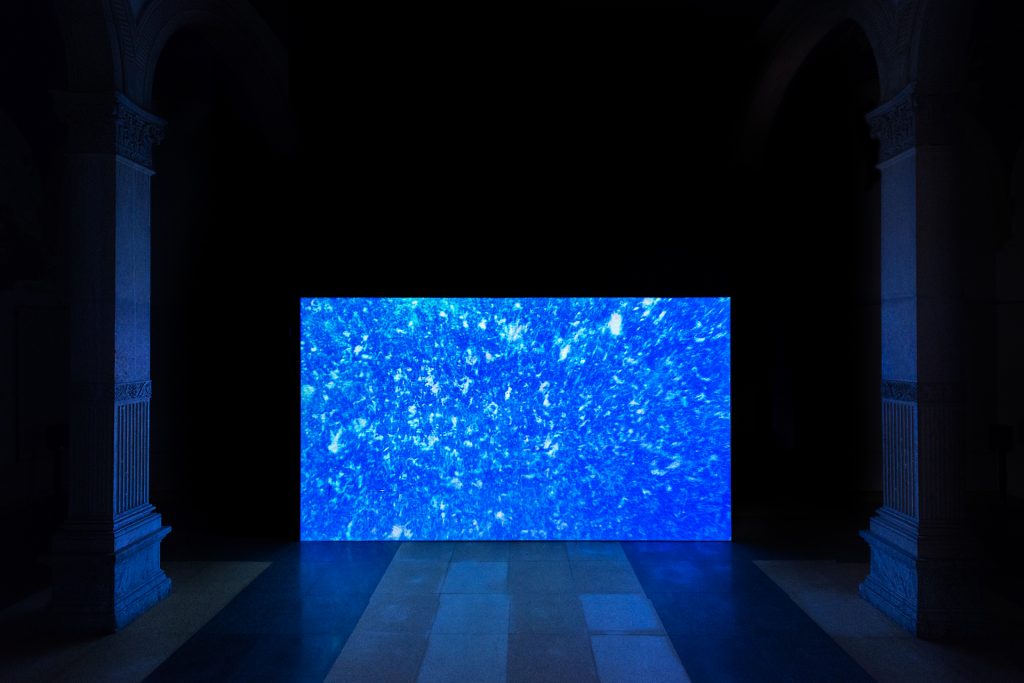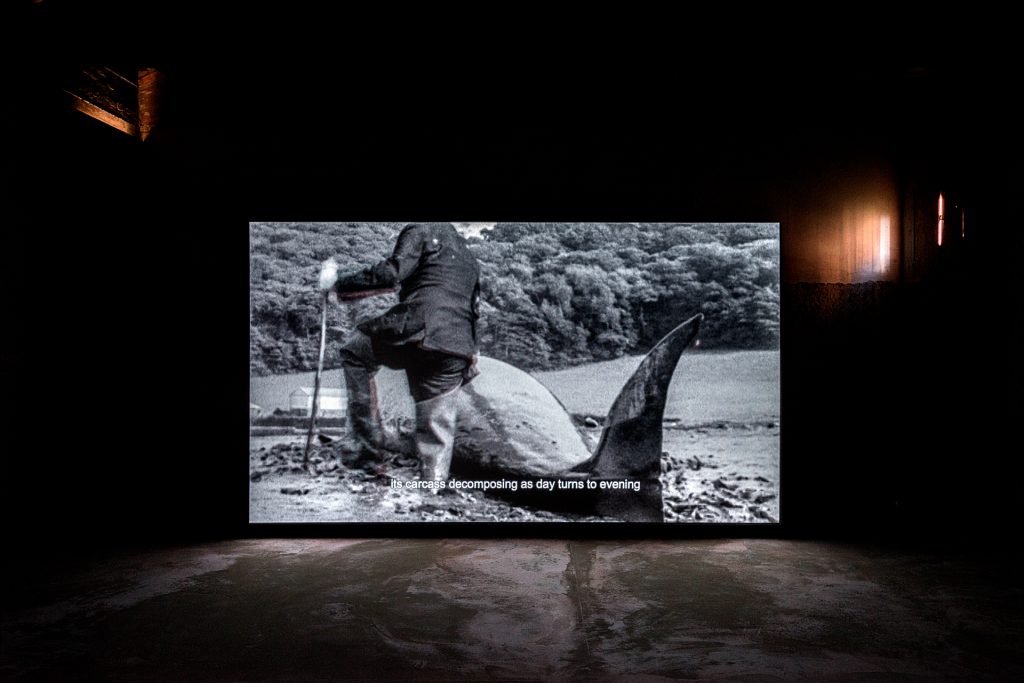Exhibition
An exhibition of a new and ambitious body of work by Shezad Dawood across two sites in Venice to coincide with the 57th Art Biennale. The show marks the launch of Leviathan, a ten-part film cycle conceived and directed by Dawood that will unfold over the next three years.
In dialogue with a wide range of marine biologists, oceanographers, political scientists, neurologists and trauma specialists, Leviathan explores the notions of marine welfare, migration and mental health and their possible interconnections.
The first three episodes of the film are presented alongside a new series of textile and sculptural works in the newly-restored Palazzina Canonica, the former headquarters of the Institute of Marine Sciences in Venice, which is opening to the public for the first time since the 1970’s. The two-part exhibition also features textile paintings and a new site-specific neon work installed in the showroom and gardens of the Fortuny Factory in the Giudecca, established in 1919 and still operational today.
Leviathan is presented by the Fondazione Querini Stampalia, the Institute of Marine Sciences and Fortuny and curated by Alfredo Cramerotti.
Public Programme
Leviathan brings together a series of public conversations with specialists from the fields of marine welfare, migration and mental health who have helped inform the project. The events include contributions from Fabio Trincardi, director of the Institute of Marine Sciences, forensic expert Cristina Cattaneo from the Labanof, University of Milan, philosopher Franco “Bifo” Berardi, sociologist Paolo Boccagni and psychoanalyst Renos Papadopoulos, as well as investigative journalist Margot Gibbs and Silvia Mancini from Médecins Sans Frontières (MSF).
underwater noise sonic performance
Seth Ayyaz in collaboration with Aleksandra Kruss (CNR-ISMAR),
10 May 2017
alien species
Tiziano Scovacricchi (CNR – ISMAR), 11 May 2017
leviathan: a beginning
Shezad Dawood in conversation with Alfredo Cramerotti, 11 May 2017
lost identities
Cristina Cattaneo (Labanof) with Prefetto Vittorio Piscitelli
(Commissario Straordinario per le Persone Scomparse), 11 May 2017
waves and patterns in a climate change perspective
Angela Pomaro (CNR – ISMAR), 11 May 2017
human impacts in total lack of awareness:
our pervasive modification of submarine ‘seascapes’
Fabio Trincardi (CNR – ISMAR), 12 May 2017
mental health and trauma:
msf experience with asylum seekers in sicily
Silvia Mancini (MSF Medici Senza Frontiere), 12 May 2017
the law of the land vs the law of the sea at the border of maritime ethics
Giacomo Orsini (Institut d’Etudes Européennes, Université Libre de Bruxelles), 12 May 2017
no way out. notes on the philosophical implications
of the concept of anthropocene
Franco “Bifo” Berardi in conversation with Sandro Carniel
(CNR-ISMAR), 12 May 2017
the extraordinary power of marine microbes
Gian Marco Luna (CNR – ISMAR), 13 May 2017
a history of algae and autarchy
Simona Armeli and Alessandro Ceregato (CNR – ISMAR), 13 May 2017
emotionally on the move: three lifetimes, three homes, three emotions in migrants’ everyday lives
Paolo Boccagni (University of Trento), 13 May 2017
who rules the waves: sinking islands that oil loves
Margot Gibbs (Freelance Investigative Journalist and Researcher),
13 May 2017
nothing new, everything new under the sun
Davide Tagliapietra (CNR – ISMAR), 14 May 2017
orange stigmata and traumatising discourses
Renos Papadopoulos (Centre for Trauma, Asylum and Refugees, University of Essex), 14 May 2017
the footprints you don’t see
Francesco Falcieri (CNR – ISMAR), 14 May 2017
screenings
The Canonica host a programme of free film screenings every Friday evening at 7pm. In partnership with MUBI.
the sacrifice (1986)
Andrei Tarkovsky, 19 May
fire at sea (2016)
Gianfranco Rosi, 26 May
melancholia (2011)
Lars von Trier, 2 June
taklub (2015)
Brillante Mendoza, 9 June
la jetée (1962) + junkopia (1981)
Chris Marker, 16 June
les hommes de la baleine (1956)
Mario Ruspoli, 23 June
lost persons area (2009)
Caroline Strubbe, 30 June
motus maeva (2014)
Maureen Fazendeiro, 7 July
logical revolts (2012)
Louis Henderson, 14 July
motus maeva (2014)
Maureen Fazendeiro, 21 July
melancholia (2011)
Lars von Trier, 28 July
mémoires d’un juif tropical (1986)
Joseph Morder, 4 August
taklub (2015)
Brillante Mendoza, 11 August
la jetée (1962) + junkopia (1981)
Chris Marker, 18 August
lost persons area (2009)
Caroline Strubbe, 25 August
Recordings of all conversations can be found here.
No Way Out. Notes on the Philosophical Implications of the Concept of Anthropocene
Franco “Bifo” Berardi in conversation with Sandro Carniel (CNR-ISMAR)
This conversation was part of the Leviathan Public Programme in Venice and took place at the Palazzina Canonica on 12th May 2017.
Contributors
Aleksandra Kruss
Aleksandra Kruss was born in Poland and currently lives in Venice, Italy. A trained marine physicist and philosopher, she is an explorer of the underwater world. After finishing her philosophical degree at the University of Gdansk (Poland), she decided to move her focus from meta-physics to physics. During her studies at the Technical University of Gdansk, she embarked upon a new adventure: imaging the marine environment using acoustic tools. She has been working in the UK, Spain, the Arctic and Italy, focusing mainly on the morphology and habitats of the sea bottom. In Venice, she investigates lost treasures of the past and underwater noise – the audible sign of our current civilization.
Read Paper
Angela Pomaro
Angela Pomaro graduated in Civil Engineering at the University of Padua in 2007. From 2004 she cooperated with the Architecture, Urban Planning and Survey Department of the University of Padua. After a work experience abroad at Studio ST Architects in New York, in 2009 she founded C+P Engineers Studio di Ingegneria Comerlati Pomaro. Since 2012 she has been cooperating with the Institute of Marine Sciences (ISMAR) of the Italian National Research Council (CNR) in Venice, within the European funded project ‘MyWave’. Her scientific interests focus on wave modelling and forecasting, as well as on data analysis and acquisition, within the fields of physical oceanography, offshore engineering and climate change.
Cristina Cattaneo
Cristina Cattaneo, forensic pathologist and anthropologist, received a BSc in in Biomedical Sciences at McGill University, Canada, an MA in Osteology, Funerary Archaeology and Paleopathology and a PhD in Pure Sciences at the University of Sheffield, UK. After moving to Italy, she graduated in Medicine and specialised in Legal Medicine. She is currently Full Professor of Legal Medicine at the Faculty of Medicine of the Università degli Studi di Milano (Italy), founder and director of LABANOF, Laboratorio di Antropologia e Odontologia Forense at the Institute of Legal Medicine. Since 2014 she has been the coordinator for the Governmental Office of the Commissioner of Missing Persons for the identification of dead migrants in Rome, Italy.
Read Paper
Davide Tagliapietra
Davide Tagliapietra is a biologist and researcher at the Institute of Marine Sciences (ISMAR) of the Italian National Research Council (CNR) in Venice since 2001. His main field of study is the ecology of coastal transitional ecosystems such as lagoons and estuaries, with particular reference to the benthic compartment. Subject of study are benthic macrofaunal population and community dynamics, bioindication, relationships between benthic ecology and hydrogeology, habitat typology and classification. Over the last decade his research has been addressing wood biorerosion in the marine environment particularly important for the damage to the Cultural Heritage sites. He is co-author of the Italian manual of methods for the study of the marine benthos and co-editor of the Atlas of the Lagoon of Venice.
Read Paper
Fabio Trincardi
Fabio Trincardi is currently Director of the Institute of Marine Sciences (ISMAR) of the Italian National Research Council (CNR) in Venice, Director of RITMARE (a large ‘flagship’ program on marine and maritime research sponsored by MIUR), and President of CORILA (Consortium for the coordination of research activities concerning the Venice lagoon system). After his degree in Geology at the University of Bologna he specialised in marine geophysics through a fellowship at the University of Trieste and two years of post-doc fellowships at the US Geological Survey in Menlo Park, California. His scientific interests focus on the evolution of continental margins from the shoreline to the abyss, integrating geophysical, sedimentological and geo-chronological methods, and on the study of past climate regimes.
Francesco M. Falcieri
Francesco Falcieri completed his university studies in Marine Biology at the Università Politecnica delle Marche in 2007 and obtained a PhD in Marine Biology and Ecology in 2012. He currently holds a post-doc position at the Institute of Marine Sciences (ISMAR) of the Italian National Research Council (CNR) in physical oceanography. He focus his research interests on the physical dynamics of marine and lacustrine environments, on processes that lead to the formation of dense waters and their dynamics, riverine plume dynamics, dispersion of pollutants and particles and observation of small scale turbulent processes.
Read Paper
Franco Berardi
Franco Berardi Bifo is a contemporary writer, media-theorist and media-activist. He founded the magazine A/traverso (1975-1981) and was part of the staff of Radio Alice, the first free pirate radio station in Italy (1976-1978). Like other intellectuals involved in the political movement of Autonomia in Italy during the 1970’s, he fled to Paris, where he worked with Felix Guattari in the field of schizoanalysis. His recent publications include The Soul at Work (Semiotext(e), Los Angeles, 2009), After the future (AK Press, Oakland, 2012), and HEROES (Verso Futures, London, 2015). He has been contributing to several magazines and lecturing in many universities around the globe.
Giacomo Orsini
With a focus on the most empirical outcomes of European integration, Giacomo Orsini has conducted much fieldwork research along the European external border in Melilla, Malta, Lampedusa and Fuerteventura. He is Senior Research Officer of the Department of Sociology of the University of Essex for the ESRC funded project ‘Bordering on Britishness: an Oral History Study of 20th century Gibraltar’. Since 2015 he has been working as Maître de Conference of the Institut d’Etudes Européennes of the Université Libre de Bruxelles. His research areas are concerned with borders, migration and asylum, maritime sociology and the sociology of everyday life, contemporary governance systems and governmentality.
Gian Marco Luna
Gian Marco Luna is research scientist at the Institute of Marine Sciences (ISMAR) of the Italian National Research Council (CNR). He holds a degree in Marine and Oceanographic Biological Sciences from the University of Ancona (2001), and a PhD in Marine Biology and Ecology from the Polytechnic University of Marche (2005). His research investigates the role and biodiversity that aquatic microbes play across the global ocean, spanning from the more human-impacted coastal ocean to the dark, and still mostly unknown, deep abyssal layers.
Margot Gibbs
Margot Gibbs is an investigative journalist, writer and campaigner. Her work has appeared in Africa Confidential, the Financial Times, the Guardian and Private Eye. She has investigated corruption in arms and oil with Greenpeace and Corruption Watch UK. For the past two years she has been researching the system of governance created by Flags of Convenience and its impact on such pressing global issues as climate change, tax avoidance and labour rights.
Paolo Boccagni
Paolo Boccagni is a sociologist at the University of Trento and principal investigator of the ERC project HOMInG – the Home-Migration Nexus. His main research fields are transnational migration, social welfare, care, diversity and home studies, as well as qualitative research at large. His research on migrants’ emotional life focuses on emotions such as ambivalence, nostalgia, estrangement and feeling-at-home. He is a member of the editorial boards of Comparative Migration Studies and Mondi Migranti, and a founding member of the IMISCOE research group IMASP – International migration and social protection. His recent book Migration and the search for home was published by Palgrave in 2017.
Renos Papadopoulos
Renos Papadopoulos, PhD is Professor of Analytical Psychology and Director of the Centre for Trauma, Asylum and Refugees (CTAR), a member of the Human Rights Centre, and of the Transitional Justice Network, all at the University of Essex, UK, as well as Honorary Clinical Psychologist and Systemic Family Psychotherapist at the Tavistock Clinic in London. In addition, he is a training and supervising Jungian psychoanalyst and systemic family psychotherapist in private practice. As consultant to the United Nations and other organizations, he has been working with refugees, tortured persons and other survivors of political violence and disasters in many countries. He lectures and offers specialist trainings internationally and his writings have appeared in fourteen languages.
Read Paper
Sandro Carniel
Sandro Carniel, Ph.D., physical oceanographer, is Senior Scientist at the Institute of Marine Sciences (ISMAR) of the Italian National Research Council (CNR) in Venice, where he joined in 1999. His fields of interest are mainly related to air-sea interactions, turbulence, integrated atmosphere-ocean-wave and sediment transport models, with particular attention to coastal environments. Author of more than 200 papers and scientific contributions in international journals and magazines, his most significant works contributed to improving the understanding of transport and mixing processes that regulate the marine circulation, also in light of climate change. His latest book Oceani. Il futuro scritto nell’acqua was published by Hoepli in 2017.
Silvia Mancini
Silvia Mancini is an experienced Médecins Sans Frontières staff. She has been working in epidemiological and public health field as well as in advocacy. Her scientific expertise focuses on nutritional and mortality research, health assessment and surveillance system carried out in several developing countries in Africa as well as in Asia. She is carrying out advocacy activities on health campaigns (i.e. vaccination dossiers, R&D topics, mental health and migration) specific to the organisation. She holds a master in Public Health from the London School Hygiene Tropical Medicine.
Simona Armeli
Simona Armeli Minicante holds a Master degree in Marine Biological Resources from the University of Palermo and a PhD in Environmental Sciences from the University Ca’ Foscari of Venice. Her research focuses on the study of biodiversity of marine algae (seaweeds) through microscopic observations and molecular techniques of DNA barcoding. She holds a post-doc position at the Institute of Marine Sciences (ISMAR) of the Italian National Research Council (CNR) in Venice, where she curates the Algarium Veneticum, a scientific herbarium containing more than a thousand of dry pressed algae from the Venice lagoon, representative of the high biodiversity of its ecosystem.
Alessandro Ceregato
Alessandro Ceregato graduated in Natural Sciences, obtained a PhD in Palaeontology, and a Master in Historical Scientific Museology, focusing his investigation on recent and fossil marine environments, working with historical scientific heritage and museum collections. Ceregato joined the Institute of Marine Sciences (ISMAR) of the Italian National Research Council (CNR) in 2002, embarking on several oceanographic cruises and collaborating in national and international scientific projects. In 2010 he started working on the algae collection Algarium Veneticum. He is currently supervising the development of an open-access digital repository for the Archivio di Studi Adriatici, and a GIS platform for sharing historical maps, in collaboration with CNR IRCrES, and the IUAV University.
Tiziano Scovacricchi
Tiziano Scovacricchi is a research biologist at the Institute of Marine Sciences (ISMAR) of the Italian National Research Council (CNR) in Venice. He graduated at the University of Padua and with a Master degree in Agri-Food Economics and Business from the Catholic University of Cremona. His main interest and expertise lies in the field of biology and reproduction of crustaceans, and more recently in issues dealing with the introduction and the diffusion of invasive alien species such as the Louisiana red swamp crayfish and their impacts on the environment and the ecosystem. He is the author of a number of scientific and educational publications and books and has been the coordinator of several research and consultancy projects.

